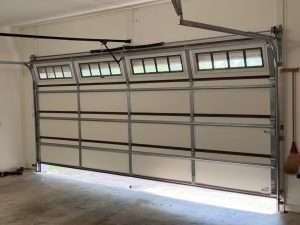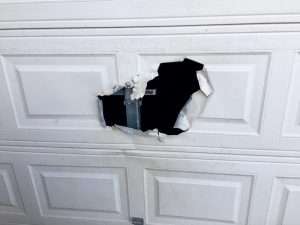Garage Door Opener Smoking? Here’s Why…

If you’re garage door opener stops working, and you see smoke coming from the motor, you most likely have a blown starting capacitor. The capacitor is a part inside your opener that stores energy and helps start the motor every time you press the button.
If you don’t see smoke, you might hear a clicking or humming sound coming from the motor. This is the motor trying to run, but there isn’t enough energy in the capacitor to get it started. In this article, we discuss common issues with capacitors and also how to prevent a fire in your garage door opener.
Garage Door Opener Humming or Clicking

Some garage door opener capacitors will not release smoke when they blow. The opener will make a light “humming” or “clicking” sound every time you press the wall button. This could be the result of a blown capacitor.
When a starting capacitor in a garage door opener does not have enough stored energy to get the motor running, it will show these symptoms. The most economical place to start is to replace the capacitor. If a new capacitor does not resolve your problem, the next option would be to replace the circuit board.

A very common symptom of a bad circuit board is a clicking sound coming from the garage door opener motor head. Occasionally, it will be a single click and other times you will hear multiple clicks in no particular order and the light bulb will begin to flash erratically as well. This is most likely a bad circuit board.
Why Did My Starting Capacitor Blow?

The starting capacitor in your garage door opener failed for two reasons. One is the age of the unit. If your opener is older, the capacitor probably reached the end of its life cycle. It’s time to replace the capacitor.

Another way a starting capacitor will fail is if someone runs the garage door opener too many times in a row… especially if the outside temperature is really hot. Residential garage door openers have a maximum number of cycles they are designed to run in a given amount of time. This is why they are rated for residential duty vs. commercial duty. A commercial garage door opener is run continuously throughout the day, so it has a higher duty cycle.

If you continually run your residential opener over and over and don’t give it time to cool down, you will blow the starting capacitor. This is common when kids get the remote for the garage door opener and keep pressing the button over and over.
Older Genie and Overhead Door PMX Openers

We have seen on a few occasions where the capacitor has blown in an older Genie or Overhead Door PMX garage door opener and the unit went completely dead. We take the unit apart, install a new capacitor, only to find out the unit will not run. I have noticed on the units we have had this issue with that they smoke for a much longer period of time and they make a humming noise like they are locked up. It is most likely a bad circuit board which means the unit will need to be replaced unless you can locate an old circuit board.
When you replace the capacitors in these units, you want to make sure to put the covers back on before you attempt to run the unit. Some units require this for them to operate properly.
Why Does the Garage Door Opener Run After It Cools Down?
If a garage door opener sits idle for a period of time, a blown starting capacitor can build up and store enough energy to run the opener a few cycles. After running a few cycles, the opener will usually stop running and make a humming or clicking sound. The blown capacitor cannot store enough energy needed to get the motor running more than a few cycles. Replacement is necessary.
Is My Garage Door Opener Catching Fire?
No. Don’t be alarmed.
Your garage door opener is not catching fire. A starting capacitor will release pressure through a hole in the front or a crack created from the blown part. When it does this, there will typically be smoke coming from the capacitor and many times there will be a sweet burning smell. This is normal.
It is easy to get alarmed when you see smoke coming from your garage door opener motor. The visual picture you immediately get is your house is catching fire, and it creates panic. The smoke coming from a blown starting capacitor will usually go away after a few minutes. A large puff of smoke will initially be released due to pressure and heat build up inside the garage door opener capacitor. Once it releases the pressure, it should not continue to smoke.
Can My Garage Door Opener Catch Fire?

Yes… if you have a bird’s nest.
While out on a service call, we recently came across an issue that could pose a real threat to any home. We were servicing a customer’s home that had two garage doors, one smaller door and one larger door. The smaller garage door wasn’t used much, so they didn’t pay much attention to it.
After we had finished repairing the larger door, the homeowner wanted new garage door remotes, so we proceeded to program remotes to both garage doors. After running the small door, we started to smell something burning. Since we were on a ranch, I assumed tree brush was being burned somewhere on the property.
As we continued to oil the garage doors, the smell became more prominent. I looked up at the garage door opener on the small door and there was smoke coming from the opener light cover. As we looked closer, a bird had built a nest inside the light cover and the light bulb was starting to ignite the bird’s nest.
We quickly grabbed our quarter inch nut driver and removed the light cover, disposing of the charred bird’s nest. Who knows what could have happened if this problem had not been caught in time. The customer informed me that they seldom close the big garage door because they are in and out so much. This explains how the birds had enough time to build a nest.
Make sure you don’t have a bird’s nest or any other debris in the light cover of your garage door opener. If you start to see build up in your garage door opener light cover, clean it immediately. A light bulb can get hot enough to ignite a dry bird’s nest. This can be a serious fire hazard. Keeping the cover clean will also provide the best light output, which is important for safety. If you experience this issue, try using an LED bulb that won’t get so hot.
After searching the Internet, we found another website talking about the very same issue. The link can be found here.
DC Motor Garage Door Opener
Many of the newer garage door openers feature DC motors for ultra-quiet performance. These newer motors do not have a starting capacitor. If you have one of the newer garage door openers with a DC motor, and it is humming or clicking, you most likely need a new circuit board. It is very common for circuit boards to fail during storms or power outages.
3/4 HP Garage Door Openers
If you have a 3/4 HP garage door opener, you might need one or two capacitors, depending on the model you have. Some older 3/4 HP units require two capacitors to get the motor running. You will need to unplug your opener from the power outlet, remove the motor cover, and check to see which capacitor your motor uses and how many it requires.
Conclusion

Hopefully, this article will put your mind at ease if you saw smoke coming from your garage door opener. If you see smoke coming from somewhere else in the garage, it could be grandma sneaking a cigarette. To stay on her good side, it’s probably best not to tell anyone.






